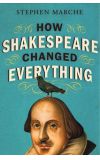
17 May 2011 07:45:22
You may not know either that scholars have counted 1,700 English words that Shakespeare introduced, coinages that are now such standbys as dawn, bandit and fashionable. At least two of them have meanings that they still wonder about: prenzie and scamels.
If these facts have escaped you, "How Shakespeare Changed Everything" will provide the details and keep you amused while it does. The book's dust jacket features a head-and-shoulders portrait of the poet with a starling perched just above his receding hairline. His eyes roll upward, as if wondering what the starling will do next.
"Unpredictability may be one of life's greatest gifts" is the ironic conclusion that author Stephen Marche draws from "Henry IV, Part One."
That play contains his only mention of a starling.
Such oddities are not just candy coating for Marche's thoughts on Shakespeare. They also underpin bold statements like the opening sentence in his book: "William Shakespeare was the most influential person who ever lived."
A novelist, university teacher and culture columnist for Esquire, he combines his analyses with witty and overwhelming admiration. Some of his scholarly ideas are described in 21st-century terms. A teacher who makes the class read the book won't get much backlash from the sourpuss who calls Shakespeare dull and out-of-date.
"Romeo and Juliet are beautiful not despite their absurdity but because of it," he writes. "... God, we love to watch young people being destroyed. We crave it. That's why we have gossip magazines, so we can watch Lindsay Lohan and Britney Spears and the Olsen twins self-destruct."
Marche finds more sympathy among the young for the woes of their elders.
In the last scene of "King Lear," the crazed old man weeps over the body of Cordelia, his one faithful daughter, hanged by their enemies. He is not sure whether she is dead or alive.
"I have seen, with my own eyes," he writes, with more emotion than usual, "a theater full of adolescents, removed from Shakespeare by four centuries and a continent, weep at this final scene. After experiencing `King Lear,' the concept of justice seems like a ludicrous practical joke our ancestors played on us out of spite."

